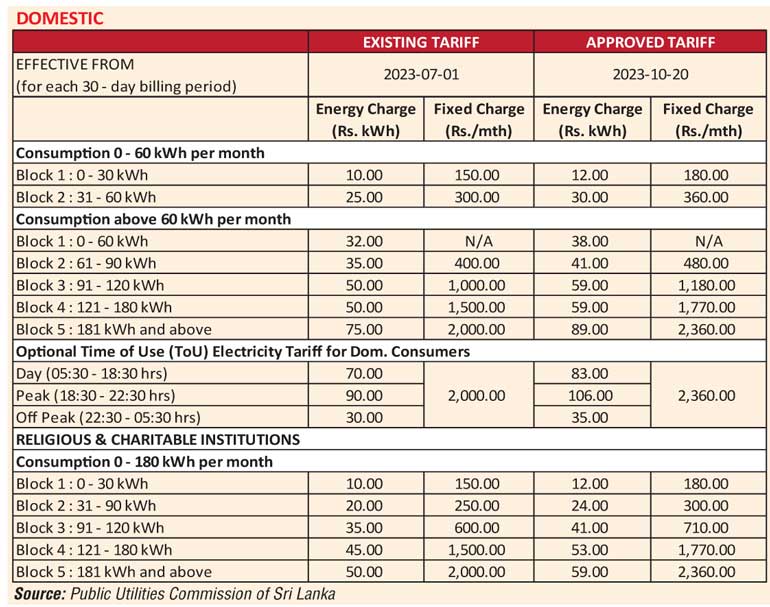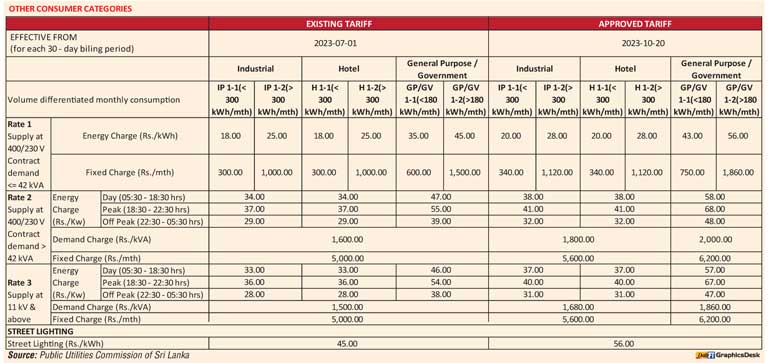Saturday Apr 19, 2025
Saturday Apr 19, 2025
Saturday, 21 October 2023 00:29 - - {{hitsCtrl.values.hits}}

The Public Utilities Commission of Sri Lanka (PUCSL) approved the Ceylon Electricity Board (CEB) request to increase electricity tariffs by 18% on average for all categories from yesterday subject to several conditions, marking the third revision for 2023.
It was startling that the electricity regulator approved the tariff hike, when it has acknowledged that the CEB has not complied with all conditions specified in the tariff approvals granted on 14 February and 30 June 2023 that have not yet been fulfilled.
The regulator justified the move noting that it was to boost the revenue of the State-run utility — CEB cited the need to cover costs associated with power generation and losses. In an unconventional move, the CEB in September expedited its submission by bypassing the usual January cycle, aligning with a Cabinet decision, he said.

The CEB’s request for the tariff hike was presented in an unconventional move in September, bypassing the usual January cycle, and aligning with a Cabinet decision. As per the least cost-based method, tariffs will be revised only in every six months in January and July.
As per the tariff revision, the bizarre fact of this hike is the domestic category is the most impacted, which has nearly five million followed by the industrial and hotel, general purpose and Government as well as religious and charitable institutions.
For the least usage groups of up to 0-30 units, 31-60 units and 61-90 units, the CEB has been allowed to increase by 16.6% for the monthly bill to be Rs. 180, Rs. 360 and 480 respectively. The usage groups of 91-120 units, 121-180 units and 180 units and above will be increased by 15.25% for a monthly bill of Rs. 1,180, Rs. 1,770 and Rs. 2,306 respectively.
To ensure compliance and efficiency within the CEB, the PUCSL has set forth a series of conditions for tariff approval. These include:
13.To eliminate the waste and non-productive expenditure to minimise/eliminate such expenditure in the electricity supply cost
Separately, CEB Senior Engineers› Association Spokesman Nandika Pathirage said if the 14% tariff reduction was not imposed in June 2023, the utility provider could have managed the expenses without opting for a special revision in October till January 2024.
“We all must remember that the CEB is a State-Owned Enterprise (SOE) and it is not making any profits. However, it is an essential institution and thus it needs to be operational,” he told journalists yesterday following the tariff hike.
In addition, the irked electricity users said they were disappointed with the PUCSL’s decision to allow the complete 18% requested by the CEB without considering any of the concerns raised during public consultations.
“The written and verbal consultations concluded on 18 October were just another show to tick the protocols. The Commission has not considered any of the concerns raised by the electricity users,” they claimed.
CEB United Trade Union Alliance Convener Ranjan Jayalal said tariff hike will have no favourable impact on the economy; rather it would further burden the battered public and enterprises.
Discover Kapruka, the leading online shopping platform in Sri Lanka, where you can conveniently send Gifts and Flowers to your loved ones for any event including Valentine ’s Day. Explore a wide range of popular Shopping Categories on Kapruka, including Toys, Groceries, Electronics, Birthday Cakes, Fruits, Chocolates, Flower Bouquets, Clothing, Watches, Lingerie, Gift Sets and Jewellery. Also if you’re interested in selling with Kapruka, Partner Central by Kapruka is the best solution to start with. Moreover, through Kapruka Global Shop, you can also enjoy the convenience of purchasing products from renowned platforms like Amazon and eBay and have them delivered to Sri Lanka.
Discover Kapruka, the leading online shopping platform in Sri Lanka, where you can conveniently send Gifts and Flowers to your loved ones for any event including Valentine ’s Day. Explore a wide range of popular Shopping Categories on Kapruka, including Toys, Groceries, Electronics, Birthday Cakes, Fruits, Chocolates, Flower Bouquets, Clothing, Watches, Lingerie, Gift Sets and Jewellery. Also if you’re interested in selling with Kapruka, Partner Central by Kapruka is the best solution to start with. Moreover, through Kapruka Global Shop, you can also enjoy the convenience of purchasing products from renowned platforms like Amazon and eBay and have them delivered to Sri Lanka.